White House Wants Harsh Taxes for Crypto Miners, Cites Environmental Damage

On the afternoon of May 2nd, the White House published a blog post titled “Making Cryptominers Pay for Costs They Impose on OthersFederal Open Market Committee”. The text details the Biden administration’s “DAME” tax which is seeking to punitively burden cryptocurrency miners for allegedly having a severe negative impact on the environment, and, more broadly, people’s quality of life.
Biden Administration Pushes for Punitive DAME Tax For Cryptocurrency Miners
This Tuesday, the White House outlined the reasoning behind its proposed Digital Asset Mining Energy (DAME) excise tax. The tax would target cryptocurrency miners for what the Biden administration considers to be highly detrimental effects their activities have on the environment and people’s quality of life.
The text published by the White House highlights several key areas of interest but highlights the alleged disproportionate impact on the environment cryptocurrency mining has. The Biden administration states that the miners’ impact is high even when using clean energy as their electricity consumption “reduces the amount of clean power available for other uses, raising prices and increasing overall reliance on dirtier sources of electricity.”
The Biden administration also states that, along with the adverse effects cryptocurrency mining allegedly has, it does not generate the benefits other businesses with similar rates of energy consumption offer. The White House also arguably dismisses the danger of digital assets operations moving abroad citing other major economies, like China, that have also imposed restrictions.
The text concludes that while the DAME tax is not a cure-all, it represents a key part of the administration’s effort to curb the damage caused by climate change and tackle increasing energy prices affecting Americans. The White House estimates that the tax would raise $3.5 billion over the course of a decade.
Is The White House Trying to Kill Digital Assets in America?
The White House introduced its first-ever cryptocurrency-focused framework only in late 2022 and has, since then, taken on a decidedly hawkish rhetoric toward the industry. Notably, its roadmap published in January proved highly critical of Congressional tardiness when it comes to legislation aimed at governing digital assets, and highly positive toward regulators’ actions with regard to the sector.
The endorsement of the actions of watchdogs like the SEC came at a pivotal moment as the Commission has become increasingly aggressive toward the industry targeting even well-regarded companies like Coinbase. The enforcement has recently brought an exodus of various digital assets companies from the US which are, almost universally, citing regulatory uncertainty as the cause for their departure.
State governments, on the other hand, vary widely in their approach. Several have already passed laws aimed at protecting cryptocurrency miners from discrimination—the latest being Arkansas. Wyoming has also taken a more dovish stance and passed a bill that guarantees the secrecy of individuals’ private keys. Other states have, however, sought to restrict cryptocurrency-related activity and a recent bill targeting miners in taxes was faced by organized opposition by multiple advocacy groups.
This article originally appeared on The Tokenist
Sponsored: Tips for Investing
A financial advisor can help you understand the advantages and disadvantages of investment properties. Finding a qualified financial advisor doesn’t have to be hard. SmartAsset’s free tool matches you with up to three financial advisors who serve your area, and you can interview your advisor matches at no cost to decide which one is right for you. If you’re ready to find an advisor who can help you achieve your financial goals, get started now.
Investing in real estate can diversify your portfolio. But expanding your horizons may add additional costs. If you’re an investor looking to minimize expenses, consider checking out online brokerages. They often offer low investment fees, helping you maximize your profit.
Source: Read Full Article
